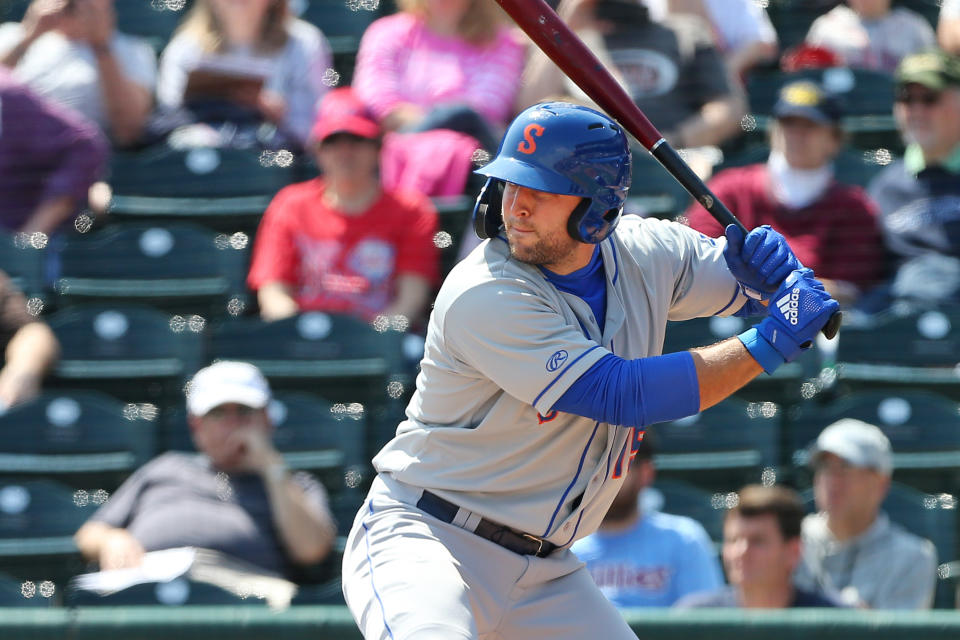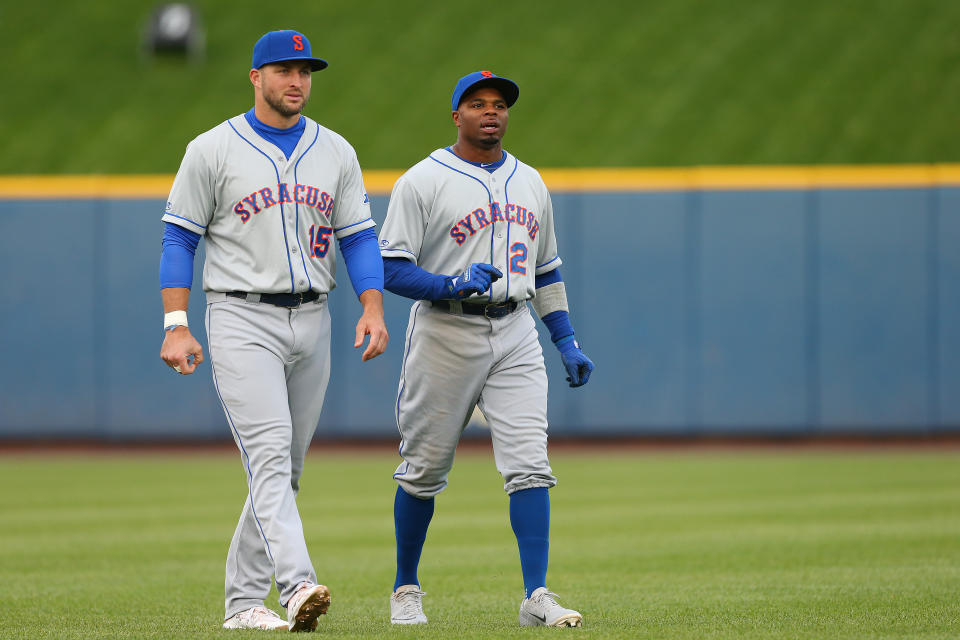Tim Tebow’s third year in baseball as told by coaches, teammates and scouts
NEW YORK — A seemingly innocuous base hit by Detroit Tigers minor leaguer Dustin Peterson quickly became an important moment for one of sports’ most intriguing stories.
The single brought a merciful and conveniently timed end to the third chapter of Tim Tebow’s journey with the New York Mets. The ball opened up a cut on Tebow’s finger that required eight stitches, nearly a year to the day after a fractured hamate bone ended his All-Star season with Double-A Binghamton.
It could realistically be the end of Tebow's baseball career altogether. The 2019 season was the last in which a major league club could carry 40 players after Sept. 1. Next year, that number will be whittled down to 28.
Yahoo Sports talked to a number of scouts who remained unimpressed by Tebow's play despite his stellar makeup and work ethic. It's enough to rightfully question whether Tebow will try for a fourth year as even the excitement of his presence in the minors seems to have declined this season.
The 2019 campaign was the worst so far for the now-32-year-old. He played in 77 games, batting .163/.240/.255 with four homers, 10 doubles and 19 RBIs. Tebow struck out 98 times (41 percent of his 239 at-bats) and collected 39 hits.
“He did make some strides, he was learning the swing, and it wasn't because of a lack of effort or work ethic,” Triple-A Syracuse manager Tony DeFrancesco said. “But those are valuable at-bats and playing time that, unfortunately, you can't make up in this game.”
Tebow, the 2007 Heisman Trophy winner, made more than $9 million playing quarterback for the Denver Broncos and New York Jets. He’s worked as a college football analyst for ESPN and SEC Network since 2014.
After his final baseball game this season, he reappeared a month later. This time he was on television. On a Saturday in August, a Mets minor leaguer stood in the Magic Kingdom in Orlando and argued Sunshine State college football supremacy with Hall of Famer Michael Irvin.
Tebow has significant celebrity appeal, yet for the past three summers he rides a bus toward a dream that not many feel he can achieve.

Tebow evaluations are definitely consistent
Prior to the start of the season, first-year general manager Brodie Van Wagenen -- who also happens to be Tebow’s former agent -- brought in a handful of veterans on minor league deals as depth insurance at the major league level. The stories of those players may actually illustrate the most damning case against Tebow.
The collection of vets included an experienced crop of outfielders in All-Star Carlos Gomez, two-time World Series champion Gregor Blanco and Rajai Davis, who made his own significant championship contribution in 2016.
Scouts’ comments about his play were more or less the same — and none of it was good. But there are things about Tebow that everyone with a keen eye, be it a coach, teammate or scout, can pick up right away.
“You couldn't ask for a finer human being,” remarked one scout. “He plays hard, and he gives you all he has.”
“I like the guy, and I appreciate what he's doing … he was working his ass off out in the outfield,” another scout said. “The guy is a super human it sounds like, he just doesn't have a lot of baseball instincts and feel.”
The hard work and determination was noticed by all. But, even at 31 years old, he was clearly a baseball neophyte. Rene Rivera compared his experience to a young international signing, a player that usually inks a deal at 16 years old, that needs about five to seven years to reach the majors.
In Year 3, Tebow was a step away from the big leagues.
“The game at the Triple-A level, maybe it caught him a little bit,” Blanco said. “To be a major league player, to be at this level, it doesn't just take the tools.”
Tebow loves those Friday night lights.@Mets farmhand @TimTebow swats his second homer for @SyracuseMets!
➡️ https://t.co/TJPiq1ubyh pic.twitter.com/VjhQGcNN9Q— Minor League Baseball (@MiLB) June 29, 2019
Tebow, the student of the game
Syracuse hitting coach Joel Chimelis came from the Houston Astros with DeFrancesco in the 2017 offseason. He’s worked with batting title hopeful Jeff McNeil and Mets’ single season home run record holder Pete Alonso within the past two years.
His job didn’t necessarily get easier when the Mets signed veterans to be in his lineup at Syracuse. Chimelis noted that veterans still need coaching to make adjustments, but that they pick them up right away.
Although he was roughly the same age, Tebow was certainly a different kind of project.
“It's just a matter of showing him how the body should work on a swing,” he said. “Towards the end of the season, he started feeling how the swing should work and it started showing up in at-bats, but it wasn't consistent.”
Tebow did show that he was starting to find a rhythm at the plate before the injury. The improvement resulted in a .205 average (9-for-44) and a pair of homers over the final 15 games.
Those numbers aren’t impressive by regular standards, but the average was 49 points better than when the stretch began, and the homer output matched his previous 62-game total.
“You can see it on video,” Chimelis said. “Your body was in order when you hit this pitch. You're driving the ball a little bit better now. But again, he needed more reps.
“What he's doing is not easy.”
Just by looking at him, it’s obvious that Tebow still possesses the strength and size of a professional athlete. Some evaluators have joked that he could probably still be in the NFL if he were willing to shift to tight end or linebacker.
Over the course of the season, Tebow and righty reliever Paul Sewald struck up a constructive friendship. Sewald doesn’t throw particularly hard —just a 90.6-mph average fastball velocity — but Tebow sought his guidance to better develop his arm.
“For the longest time he's had a quarterback's arm slot,” Sewald said. “ I just kind of let him in on a couple of things that, maybe, we take for granted just because we’ve played baseball forever.”
Tebow’s throwing mechanics were long, like Jacob deGrom’s, but not nearly as fluid. He and Sewald worked to shorten up the outfielder’s throwing mechanics, citing Driveline founder Kyle Boddy for the idea that baseball mechanics should closer resemble javelin throws, noting that there are less injuries.
“His muscles versus most pitchers muscles were a little different, so a lot of it was like just trying to figure out an arm slot for him that really works. I think he thought that he wanted to reach out further and make his arm longer,” Sewald said. “But it was like, your body doesn't do that, so let’s try something that works a little bit better.'”

Tebow a bit out of place among Syracuse vets
In its entirety, the seven vets (Adeiny Hechavarria, Danny Espinosa and Hector Santiago made up the rest) combined to earn roughly $165 million combined over the course of their careers.
Espinosa joined the Mets on a minor league deal in February, and has pointed to the long bus rides and time away from his family as the most grueling aspect of life in the minors.
Davis admitted there was a lot of initial complaining from the guys that have had a taste of life in the majors, who aren’t relying on their hourly wages in Triple-A. But there were kindred spirits, and other veterans going through the same thing.
“It made our life a little easier,” Rivera said. “You know you're not alone.”
The 36-year-old Rivera re-joined the Mets on a minors deal after being released by the San Francisco Giants in late March. The Mets had a need after veteran backstop Devin Mesoraco refused an assignment to the minors before the season.
Without much time to make a decision and a little fearful of what the free agent market had become, Rivera did whatever was necessary to continue playing the game.
“You make a decision, you got to stick with it, and try to play through it,” he said. “You get the opportunity to play every day and show that you can still play at my age.”
Blanco didn’t see much sense in being patient either, as the Mets were his first offer, and he took it right away.
Blanco and Rivera’s stories are ones that come to mind when scouts and other league evaluators make their most devastating criticism of Tebow. Multiple scouts used the word “terrible” to describe Tebow as a baseball player. But perhaps even more cutting is the idea that he’s taking up a roster spot from someone that truly deserves it.
There is a finite amount of space on a 40-man roster, and even less on the active list. Gomez, Santiago and Hechavarria have already been deployed to the majors and designated for assignment. Santiago and Hechavarria landed with other clubs, but Gomez has remained a free agent since the end of June.
It’s not necessarily the players like Gomez, who earned more than $50 million in 13 MLB seasons, that suffer from a roster crunch. Former Mets farmhands Ty Kelly, Kirk Nieuwenhuis, Matt den Dekker and Cody Decker all retired within the past three months, and all are just about Tebow’s age.

What will be Tebow’s baseball legacy?
The word “insane” comes up a lot when baseball people are asked about Tebow.
Why would a millionaire ride a bus all summer? Some suggest insanity.
Why would the Mets give this give this guy a third opportunity? Some suggest insanity.
But Tebow’s true mark on the game won’t likely come from what he does on the field. There is a sect among the American population in which Tebow is beloved, and it’s made him a controversial person — dating back to his days at the University of Florida and in the NFL.
For the past two seasons, whenever Tebow’s minor league team hit the road, their host could usually count on a sellout. Rival clubs would use Tebow himself to market special ticket plans for when the Mets’ affiliate would come to town.
His impact on attendance was described by one South Atlantic League team employee as “insane.”
But this year, there was a downturn in “Tebow-mania” as the year rolled along. The obvious explanation was Tebow’s lack of success, as well as his lack of opportunity after he didn’t earn much playing time.
A Syracuse.com report in June noted that the Mets being a new affiliate in Syracuse was more of a driving factor for improved attendance than simply having Tebow on the roster.
It was already a rough terrain for Tebow in professional baseball, and now the landscape is changing, and not in his favor. There’s certainly good reason to expect this might be the end of the Tebow baseball experiment, but he’s defied expectations in the past.
“It's up to Tim,” DeFrancesco said. “If he wants to continue, I'm sure it'll be an option for him to come back. But you're fighting Mother Nature.”

